The Tonight Show
A 1978 episode of the Tonight Show featured Johnny Carson in the role of Mister Rogers on his final visit to the Neighborhood. This sketch includes some very un-Mister-Rogers-like characteristics such as a lesson on child birth, charging children money to be loved, and pouring a glass of milk from a booze-filled refrigerator.
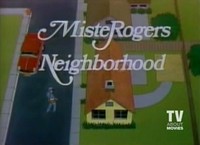
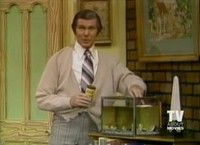
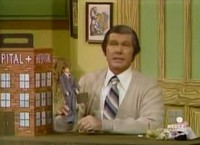
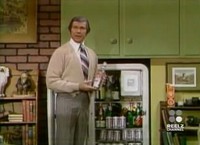
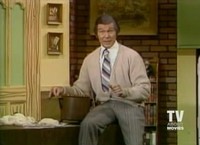
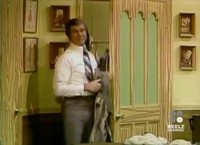
On May 16, 1978, singer Tony Bennett was a guest on the Tonight Show and shared some of his artwork including visualizations he created of Johnny Carson in this sketch. Tony Bennett also shared his artistic talents with Lady Elaine Fairchilde on Episode 1446 of Mister Rogers' Neighborhood.
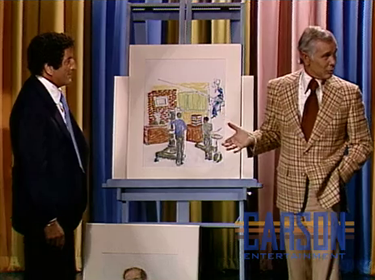
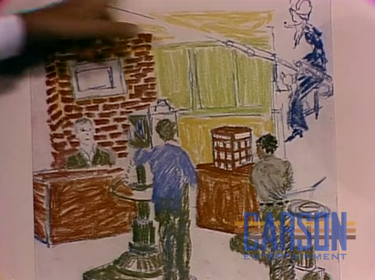
A 1985 episode of the Tonight Show featured Johnny Carson in the role of Mister Rambo -- a character combining Mister Rogers and the Sylvester Stallone character John Rambo. Throughout this sketch, Mister Rambo talks with children about various ways to punish, harm, and even kill others and themselves.
According to some sources, Fred Rogers openly complained about this sketch and Johnny Carson responded with a public apology.
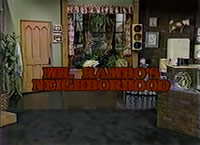
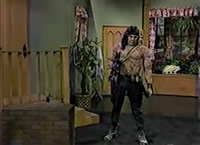
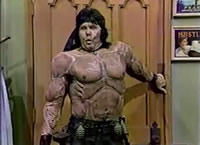
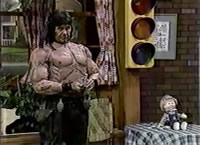
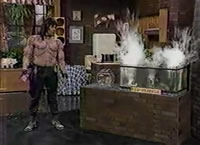
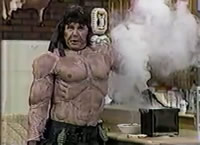
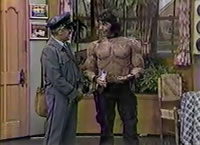
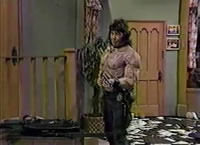
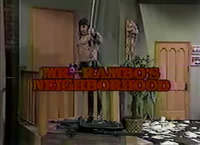
On September 4, 1980, Fred Rogers appeared as a guest on The Tonight Show. Leading in to the interview, Johnny Carson recalled -- Mr. Codgers' Neighborhood -- one of his many Neighborhood parodies.
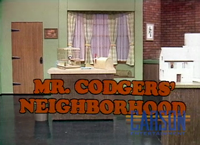
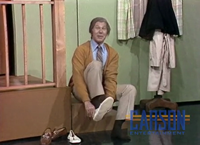
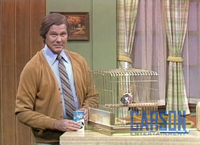
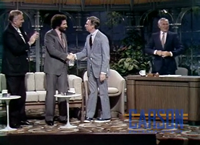
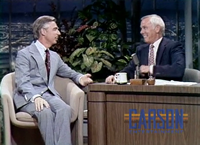
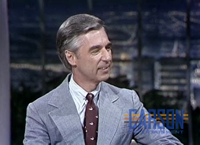
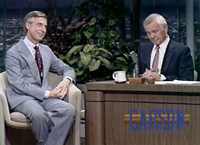
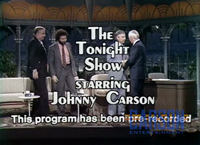
[Images courtesy of licensing.johnnycarson.com]
JOHNNY CARSON: Fred Rogers is the host of the Emmy Award winning popular children's show which he's been doing for years called 'Mister Rogers' Neighborhood' and he recently created a new program, which is also on PBS, called 'Old Friends...New Friends.' We've had a lot of fun with his show and done a couple of satires on it. So just to refresh your memory, we thought we'd play like a minute of the last one we did. So here is part of our version of 'Mister Rogers' Neighborhood.'
[Mister Codgers' Neighborhood parody plays]
JC: Would you welcome, please, Fred Rogers.
[Fred Rogers enters]
FRED ROGERS: [Referencing the parody] You didn't even have to tie your shoes.
JC: No, that's right.
FR: They were slip-ons.
JC: Fred, I didn't know if you were showing up with a lawyer or just to be a guess or to sue us tonight. Did you see either one of those sketches we did?
FR: Of course I did.
JC: What kind of reaction...did people get angry? Because you've been doing your children's show -- and it's a wonderful show -- you do a remarkable job. And we did kind of a...not a put-down but showed you in a little bit different light. And I wondered what kind of reaction...did people think we were excessively cruel?
FR: Most of the people I know like fun just as much as you do.
JC: Would you be my neighbor? You have ... you really have a wonderful voice and a wonderful attitude you have with the kids. Kids are not easy to fool. They're much brighter than most people give them credit and their hip to catch on to any kind of real phoniness. Are they not?
FR: I really think that the most important thing that we do is being honest.
JC: How long have you been doing this?
FR: Over twenty-five years.
JC: Twenty-five years? I suppose kids you used to entertain have gotten married and had kids of their own and you've got a second generation of kids again, right?
FR: And I've seen some of them in the halls here. They said, "I grew up with you. Now I have some children of my own."
JC: You used to work at NBC but not doing the children's show, right?
FR: Yes. When I first got out of college I was a floor manager for the network and did such things as the Kate Smith Hour and the Voice of Firestone and the Hit Parade and the NBC Opera Theater.
JC: So you go way back with the network. How did you get into the children's, uh...how did that start?
FR: Every day that I had free, I would go visit some children's center. An adoption agency or something. For some reason I felt as if I wanted to work with children. So when the first public station started in Pittsburgh, I applied. My friends at NBC thought I was nuts to go to a station that hadn't even been on the air yet. But I think I was led to do that.
JC: You give kids a lot of advice. What kind of reaction do you get? Do you get a lot of mail from children asking to see specific things or do you more or less set the tempo and decide what you want to do yourself? Do you have a studio audience at all?
FR: Not at all. No. As a matter of fact, I feel that it's important to have a rapport with the person at home -- the child at home. So I just look at that one person. I remember Gabby Hayes one time when I was floor managing him. Do you remember him?
JC: Oh. I'll tell you a story about Gabby because it's very funny but you go ahead.
FR: I asked him, "What do you think of when you look at that camera knowing that there are millions of people watching?" And he said, "Freddy, I just think of one little buckaroo." And that really impressed me.
JC: The idea in television is that you're supposed to assume that there are just a few people. I knew him quite well in his later years and he would come in to New York with Bill Boyd -- Hopalong Cassidy. And he used to get all dress up and we would go to Danny's Hideaway in New York. And to see Gabby Hayes with that full beard in a tuxedo going over to the Copacabana to see floor show was hysterical. [Imitates Gabby] And he would talk exactly that way.
FR: And he had a box at the opera. He was a very cultured man.
JC: On the show, you've done things that are very smart. For example, you've gotten a haircut on a show because you go back to a lot of childhood experiences that were, I suppose, traumatic or kind of terrifying at the time, and then do them for the children at home, right?
FR: Well, children are concerned when they get their first haircut that the barber's going to cut more than hair. Ears, nose, and other things.
JC: So what do you do? You have the barber come in?
FR: I go to the barbershop right on film. And then I ask him, "Do you cut anything besides hair?" He says, "No, that's why I go to school to learn to cut just hair."
JC: Somebody said that you had a cast once on your arm? Because that's another thing that kids go through when they get a cast on a broken bone or something.
FR: Sure. And when the doctor removes the cast, they're afraid that they're going to take the arm right along with it.
JC: Did you actually have a broken arm?
FR: No. Just had the cast put on.
JC: Just had the cast? Wouldn't go that far for them? Do you -- we were discussing sex when we did the take-off on your show -- do you ever...or are they too young for that?
FR: That's where they learn the differences.
JC: How do you handle it? What do you do to explain? What's your age range would you think watch the show?
FR: Mostly pre-schoolers but I hesitate to say that because there are so many older people who watch. But there's a song called "Everybody's Fancy" that I sing. Some are fancy on the outside, some are fancy on the inside. Everybody's fancy. Everybody's fine. You're body's fancy and so is mine. The second verse is very important.
JC: What's the second verse?
FR: Boys are boys from the beginning. Girls are girls right from the start. Everybody's fancy. Everybody's fine. Your body's fancy and so is mine. Because sometimes children think that they might change. They might have to change after a while. [Laughter from the crowd] And, you know, we laugh about that now but it's because we had that concern when we were little.
JC: Yeah, because you're really not sure. You thought maybe you'd become a girl or a girl would become a boy, right?
FR: Exactly.
JC: It happens frequently out here. Sometimes. What have you done on the show that's had the biggest response that kind of fools you? Something that you've done that you got a tremendous reaction?
FR: Well, many children are concerned about going down the bathtub drain. And if you have every had a two-year-old, and have pulled out the plug, that two-year-old may have screamed if he or she'd been in the tub. And there was a man beside me in the airplane who said, "You know, you did that song about you can never go down the drain and I thought it was crazy until I saw my kid screaming in the water." And so he said, "I pulled out the plug, told him to get out, that he could no go down the drain. It made all the difference in our family."
JC: We have to take a short break. We'll be right back.
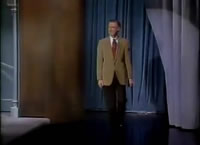
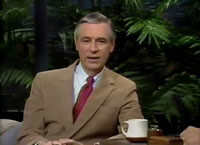
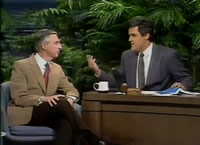
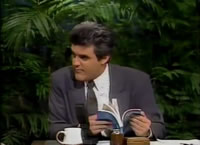
DATE: January 16, 1989
. . .
JAY LENO: My next guest, besides looking like the older brother of my last guest, has been a star on children's television for 36 years. He has a new book called How Families Grow. Please welcome Mister Rogers.
FR: He [Jimmy Brogan] said he always ended his routine with a sweater and said 'Now I'll take this off and give it back to Mister Rogers.'
JL: Nice to see you. Now you have a son named Jay also I heard backstage.
FR: I do. His name is James and another son named John. But when he went to college somebody said 'What is your nickname?' He said 'Jim' ... We had never heard that before but from then on he was Jim.
JL: Actually my full name is James but it just wound up Jay somewhere about the fourth grade. If it was easier to spell...fine. I was looking through your book and whenever I have guests on I always try to read their book. And I was like, well let me see what this is...and you know this is fascinating. I really thought it would be kind of a kids book, kind of written in a childlike way, but it's really a fascinating thing here. One thing I thought was real interesting what this part about -- page 134 -- where you'd taken the kids to a doctor and you say that the parents should go with their own instinct rather than what the doctor sometimes prescribes. You know the part I'm talking about?
FR: Yes.
JL: [Laughing] Well you wrote the damn thing. Tell us what you mean here. But I thought that was very interesting.
FR: Well, if a parent has a very strange feeling about a caretaker for a child, and that's a rare feeling for that parent, then perhaps they should find somebody else.
JL: You mean if you're going to the doctor and the doctor is telling you things that you just don't think are right for your child, just find another doctor.
FR: Especially if that's a rare feeling for the parent.
JL: I actually found some stuff I can use for comedy material in here. The part about kids taking words literally. The little girl was getting her blood pressure taken and the mother said 'The doctor's just gonna blow that up so you just sit still.'
FR: She thought it was going to blow up.
JL: Kid do take it literally.
FR: It's mighty important to be able to treat children in respect and to try to understand where they're coming from. [To the audience] Just like you.
JL: Another big one was about getting a haircut. You know, I never understood why kids yell and scream -- I mean, I used to yell and sceam when I got my hair cut but I forgot why. What was your reason?
FR: Maybe you felt that the haircut person was going to cut more than hair.
JL: Yeah. Well actually he's charging two bucks more than the other guy. That's why. But that's true that the children think if you've never had your hair cut you think someone is actually taking ... you know, cutting your fingers off is the same thing.
FR: Sure. Or anything else on your body. And when you're four or five you want to be sure that you're going to have all of your parts when you leave.
JL: Never leave the building without all of your parts. That's what I say. How do kids react when they see you? In fact, one of the women on the staff here had her child and she ... it's like meeting the Beatles, isn't it? Really, when you're five.
FR: Sometimes children wonder how that person from television got out of the television set.
JL: I wonder that myself sometimes.
FR: One time I tried to explain electronically what it was all about and a little boy said to me afterwards 'Well, how are you going to get back in?' So I decided that I would just tell them that it's a picture that we make. And all the better.
JL: You started here at NBC, didn't you, working as a...
FR: A floor manager in 1951, 2 and 3.
JL: So your goal was not to get into children's television at the time?
FR: No, not originally. But I found that public television was starting in Pittsburgh and I went there and all of a sudden we needed a children's program.
JL: And you got picked.
FR: So Josie Carey and I made a children's program and for eight years I was never seen. I just did puppets and music.
JL: Oh, I see. Do you have a song for us that you're going to do tonight?
FR: Sure. If you'd like to hear it. You know, we're very serious about what we talk about with children and something that is really tough is to deal with your anger. This is a song that we sing to children about anger. [Sings What Do You Do With the Mad That You Feel]
JL: [Applause from crowd] That's a great song!
FR: I need to tell you one thing. A child gave us the first line of that song. He said, 'What do you do with the mad that you feel when you feel so mad you could bite?' And we listened carefully and we wrote the song from it.
JL: I hope that child's getting residuals today. We'll be right back after this message...
